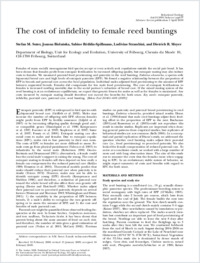The cost of infidelity to female reed buntings
- Suter, Stefan M. Department of Biology, Unit for Ecology and Evolution, University of Fribourg, Switzerland
- Bielańska, Joanna Department of Biology, Unit for Ecology and Evolution, University of Fribourg, Switzerland
- Röthlin-Spillmann, Sabine Department of Biology, Unit for Ecology and Evolution, University of Fribourg, Switzerland
- Strambini, Ludivine Department of Biology, Unit for Ecology and Evolution, University of Fribourg, Switzerland
- Meyer, Dietrich R. Department of Biology, Unit for Ecology and Evolution, University of Fribourg, Switzerland
-
03.04.2009
Published in:
- Behavioral Ecology. - 2009, vol. 20, no. 3, p. 601-608
English
Females of many socially monogamous bird species accept or even actively seek copulations outside the social pair bond. It has been shown that females profit from extrapair fertilization by increased offspring quality, but extrapair mating may also induce costs to females. We measured parental food provisioning and paternity in the reed bunting, Emberiza schoeniclus, a species with biparental brood care and high levels of extrapair paternity (EPP). We found a negative relationship between the proportion of EPP in broods and paternal care across the local population. Individual males adjusted food provisioning to the amount of EPP between sequential broods. Females did compensate for low male food provisioning. The cost of extrapair fertilizations to females is increased nestling mortality due to the social partner's reduction of brood care. If the mixed mating system of the reed bunting is at an evolutionary equilibrium, we expect that genetic fitness for males as well as for females is maximized. Any costs incurred by extrapair mating should therefore not exceed the benefits for both sexes.
- Faculty
- Faculté des sciences et de médecine
- Department
- Département de Biologie
- Language
-
- English
- Classification
- Zoology
- License
-
License undefined
- Identifiers
-
- RERO DOC 11972
- DOI 10.1093/beheco/arp037
- Persistent URL
- https://folia.unifr.ch/unifr/documents/301146
Statistics
Document views: 112
File downloads:
- Fichier principal: 133
